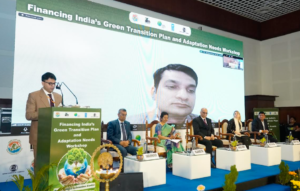Kolkata, 16th January 2025: A stakeholder consultation workshop on “Financing India’s Green Transition Plan and Adaptation Needs” was organized by Ministry of Environment, Forest and Climate Change, Government of India under the ongoing Green Climate Fund Readiness Program on 16th January 2025 in Kolkata, West Bengal. This workshop is part of an ongoing effort to understand India’s climate financing needs and create awareness across stakeholders on the scale of mobilisation needed to accelerate investment in climate resilient development in India. The workshop also focussed on the imminent need to increase investment in climate adaptation.
The inaugural session of the workshop was attended by Dr Manoj Pant, Chief Secretary, Government of West Bengal, Mr Amit Prothi, Director General, CDRI, Ms Rajasree Ray, Economic Advisor, Ministry of Environment, Forest and Climate Change, Govt of India, Mr Chandra Shekhar Ghosh, Chairman, Bandhan Group, Ms Isabelle Tschan Harada, Deputy Resident Representative, UNDP, Mr Satya Shiva Saswat, Regional Manager, Green Climate Fund and Dr Naresh Tyagi, Chairman, Indian Chamber of Commerce & Chief Sustainability Officer, Aditya Birla Group.
Dr Manoj Pant, Chief Secretary, Government of West Bengal, mentioned that in today’s era, tackling climate change is not just an environmental agenda but it is also a development imperative for which additional financial resources is needed. However, access to climate finance is constrained by challenges like institutional capacity, lack of bankable projects pipeline, and the need for standardized methodologies to integrate climate considerations into development planning. Therefore, the focus must be on scaling investments in ecosystem-based approaches, promoting climate-resilient agriculture, and enhancing infrastructure resilience. He further highlighted the importance of community engagement in climate change efforts and the need to collaborate and create decentralized, context-specific funding models. To accomplish this, it is vital to strengthen the capacity of States and local institutions to prepare robust funding proposals, such as those required by the Green Climate Fund (GCF).

Ms. Rajasree Ray, Economic Advisor, MoEFCC, in her address, highlighted that to achieve low carbon and climate resilient growth, India requires concerted efforts, a cohesive approach, and the collective efforts of all actors, policymakers, regulators, and the financial system. She also mentioned that there should be a concerted approach around taxonomy, green guidelines, and financial products, as well as defining the roles of the private and public sector and bankers and asset managers. She emphasised that the global future climate-resilient development pathways depend on how climate risks are addressed, requisite adaptation measures and the fair apportioning of the global carbon budget.
The workshop focused on understanding India’s climate actions with a focus on various financial instruments in its three technical sessions on Financing India’s Green Transition Plan, Role of the Private Sector in Financing the Transition, and Financing Needs and Gaps for Adaptation Requirements. It explored the roles that government, venture capitalists, corporations, and industry leaders can play in India’s current climate ecosystem. Discussions also focussed on strategies to boost financing in the climate-tech ecosystem, emphasizing emerging solutions with disruptive potential.
The GCF Secretariat also provided their insights on facilities available under the GCF. This consultation workshop aimed to strengthen the ongoing engagement with various stakeholders including the private sector and financial institutions to ensure effective and coherent participation in the coming future.

+ There are no comments
Add yours